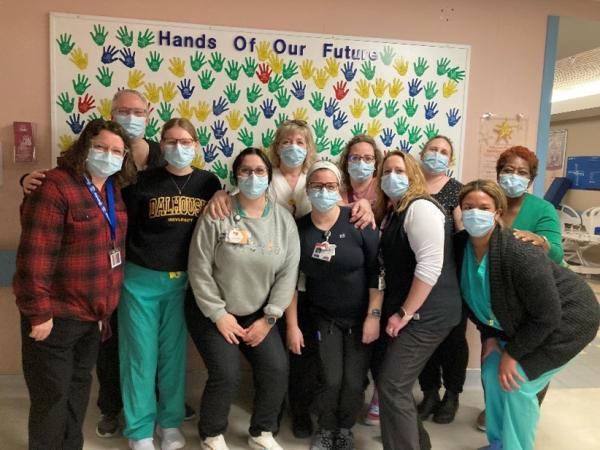A holistic approach to patient safety: enhancing patient care and experience beyond the physical

“It started with creating a basic understanding that everyone contributes to patient safety in all forms—including psychological, spiritual and cultural,” said Michelle Wile, health services manager of Women and Children’s Midwifery and Ambulatory care at South Shore Regional Hospital (SSRH).
In December 2023, Wile and her colleague Rebecca Parks, Quality Improvement and Patient Safety leader in Western Nova Scotia, attended a workshop with Healthcare Excellence Canada where they were challenged to think of patient safety differently.
“We were asked at the workshop to challenge our perception of safety,” said Parks. “By doing so we began to explore and reflect on the fact that many other forms of harm exist, such as psychological, social, cultural and spiritual harm. The takeaway message was: All forms of harm matter.”
The full-day workshop included a presentation, exercises and a series of thought-provoking questions that ultimately sparked an initiative of improvements guided by patient experience led by Wile, Parks and Wendy Young, nursing team lead of Women and Children’s at SSRH.
With support from the Western Zone Quality team members, the Women and Children’s unit at SSRH participated in a three-month action series with Health Care Excellence Canada to begin to shift the culture in the unit to thinking of safety beyond physical.
With the aim of creating a more inclusive and understanding environment, the team began having conversations with patients on the unit asking them if they felt safe and how their beliefs could be supported.
This approach highlighted areas for improvement in areas such as food accessibility, accessibility to language services, cultural diversity and the value of lived experience.
Parks conducted 21 patient interviews and 34 staff interviews, including conversations with nurses, physicians, and midwives. Patients were generally receptive and eager to share their experiences, both positive and negative.
Through the feedback, themes and learning opportunities were identified for the unit and plans were made to support the unit through their shift in culture.
Addressing stigma and educating staff
One significant revelation was the stigma felt by patients with a history of substance use. Despite the staff’s belief that they were providing equal care, patients felt otherwise.
“An example of this is when it comes to medication,” explained Young. “Part of our role as a nurse is to watch all our patients take their medication. Patients indicated they felt we were watching them due to their history. Now that we are aware of this perception, we are looking at how we improve our communication around our policies and practices, so people don’t feel singled out.”
This feedback underscores the need for better communication and education about hospital policies and patient care standards.
To address this, the team reinforced the “Eat, Sleep, Console” program, which supports pregnant patients on opioid replacement therapy. This initiative aims to manage neonatal withdrawal symptoms and keep both mother and baby comfortable.
Fostering cultural competence
Additionally, the interviews highlighted the changing demographics within the community and the need for staff to be educated about different cultures and tools available to help with language differences.
The team recognized that language barriers between patients and staff were creating challenges to safe and effective care, and more robust support was needed. Language identification cards are in the process of being printed, they connected with a language coordinator, and a language app is being installed on all Nova Scotia Health unit phones.
The team is organizing education sessions on cultural diversity, aiming to improve staff’s ability to support patients from various backgrounds and cultures, ensuring patients feel safe and supported during their time at the hospital.
By creating spaces for open conversations, the team ensures that patient feedback directly influences improvements in patient care and experience.
“Understanding patients’ needs and expectations from the moment they enter the unit is crucial for fostering a supportive and safe environment,” said Wile. “It’s evident by the staff participation that our staff want to ensure they have the knowledge and capabilities to make patients feel safe and supported during their stay.”
By listening to patients and fostering a culture of continuous learning and empathy, they are making strides toward a safer and more supportive environment for all.
Since these changes have been made on the unit, they’ve received positive feedback from patients.
This quality improvement work led by Wile, Young and Parks exemplifies how a dedicated focus on cultural shift and patient-centred care can lead to significant improvements in healthcare settings.
Photo of Staff from South Shore Regional Hospital on the Women and Children’s unit.